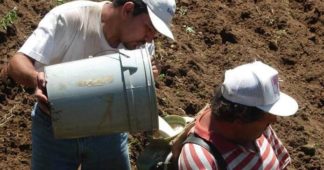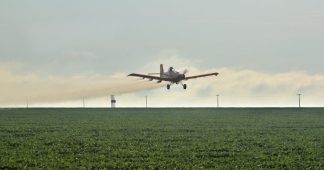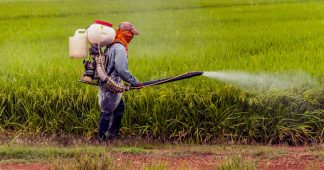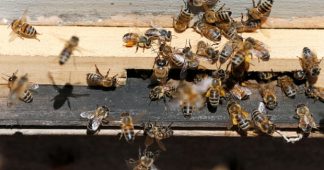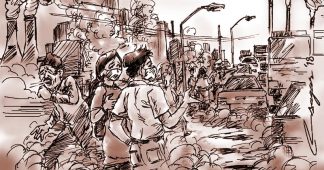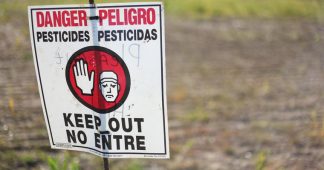More and more pesticides are being sprayed worldwide with deadly consequences for humans and nature, a report finds.
By Gero Rueter
12.01.2022
The rising use of pesticides is at the heart of environmental damage across the world, according to a new report from environmental groups in Germany.
“You encounter the issue everywhere when you deal with agriculture, health, species loss and water pollution,” said agricultural engineer Susan Haffmans from Pesticide Action Network Germany, who played a leading role in developing the Pesticide Atlas report. “It is a major cross-cutting issue.”
Together with the green-affiliated Heinrich Böll Foundation, the German branch of environmental group Friends of the Earth and the international monthly newspaper LE MONDE diplomatique, the report was presented and published Wednesday in Berlin. Its 50 pages outline harmful effects of the billion-dollar pesticide business.
“We encounter pesticides everywhere, even if we don’t live on the edge of the field,” said Haffmans.
Farmers are often poisoned
According to a recent study published in the journal Public Health, 385 million people in agriculture fall ill with acute pesticide poisoning every year. After poisoning, farm workers and farmers report symptoms that range from feeling weak and having headaches to vomiting, diarrhea, skin rashes, nervous system disorders and fainting. In severe cases, the heart, lungs or kidneys fail. About 11,000 people in agriculture die from acute poisoning every year, according to the study, which did not count deaths by suicide related to pesticides.
Agricultural workers and small farmers in the Global South are particularly affected by pesticide poisoning. According to the study, there are about 256 million acute pesticide poisonings in Asia, 116 million in Africa and about 12.3 million in Latin America. In Europe, the figure is far smaller at 1.6 million.
“We see that 44% of all workers worldwide suffer at least one poisoning per year,” said Haffmans, “and in certain countries it is much more. In Burkina Faso, for example, 83% of farm workers get sick at least once from pesticides.”
These are only the acute poisonings, she said, adding that the extent to which they occur is an indication of chronic long-term exposure, which is then in turn associated with completely different chronic diseases.
The Atlas highlights several reasons for the significantly higher number of poisonings in the Global South. First, a lot of dangerous pesticides are sprayed there, including some which are banned in Europe. In addition, many small farmers there do not wear protective clothing and are poorly informed about the dangers.
“In some cases, pesticides are simply filled into small plastic bags or bottles by traders, without labels, without safety instructions on how to use them and without warnings,” said Haffmans. “Then there are always unintentional poisonings because the pesticide is used incorrectly or someone picks up the bottle thinking maybe there is a soda in it.”
 According to the Atlas, fewer than 30% of smallholder farmers in Ghana wear gloves, goggles and mouth or nose protection when handling pesticides. In Ethiopia, only 7% of farmers are aware of the warning to wash hands after using pesticides.
According to the Atlas, fewer than 30% of smallholder farmers in Ghana wear gloves, goggles and mouth or nose protection when handling pesticides. In Ethiopia, only 7% of farmers are aware of the warning to wash hands after using pesticides.Pesticides increase cancer risk
Pesticides can be spread by the wind hundreds of kilometers and are found in rivers and groundwater. They can kill insects, birds and aquatic animals, and their residue is often found in food.
The weed killer glyphosate, which is the most widely used pesticide, is among the most infamous. In 2015, the International Agency for Research on Cancer (IARC) classified glyphosate as “probably carcinogenic”. A 2019 scientific meta-study by the University of Washington also identified an increased risk of malignant lymph node tumors from glyphosate, known as non-Hodgkin’s lymphoma.
Pesticides have also been linked to asthma, allergies, obesity and endocrine gland disorders, as well as miscarriages and deformities in particularly polluted regions.
“Studies also show a connection with Parkinson’s disease, Type II diabetes or certain types of cancer,” said Haffmans.
Profits more important than health protection
The sale of pesticides is lucrative. The four largest producers — Syngenta, Bayer, BASF and Corteva — generated sales of €31 billion ($35 billion) in 2020, according to the Atlas. In recent years, global pesticide sales have grown by an average of 4% annually.
As a rule, however, the companies do not pay for damage to health and the environment, unless they are taken to court. In the US, 125,000 people who had sprayed the pesticide Roundup with the active ingredient glyphosate and become seriously ill sued Bayer. The company has already paid some of the plaintiffs, and around €10 billion have been set aside in Bayer’s balance sheet to compensate for the damages.
Despite these cases, Bayer and other companies continue to sell highly toxic pesticides, including those that are banned in the EU because they are dangerous. Currently, pesticide manufacturers are also seeking a new authorization for glyphosate in the EU, although it is due to be banned in the bloc from 2024.
Movements for agricultural revolution
Environmental groups are pushing for a shift away from chemical pesticides. The 30 authors of the Atlas use articles to highlight policies that could lessen their impact.
“In the last two decades, Sri Lanka has demonstrably saved almost 10,000 lives by banning dangerous pesticides,” said Haffmans. In India, “some regions there already farm completely or largely pesticide-free. This, in turn, encourages imitation in other regions.”
According to a representative survey conducted in Germany for the Atlas, a majority of 16 to 29-year-olds want an agriculture that protects water, soil and insects, produces fairly without genetic engineering and pesticides, and uses natural pest control. The survey found 63% of respondents wquld like to see all pesticides banned by 2035, and farmers given support in switching to environmentally friendly production. 11% of respondents rejected this demand.
Published at www.dw.com
We remind our readers that publication of articles on our site does not mean that we agree with what is written. Our policy is to publish anything which we consider of interest, so as to assist our readers in forming their opinions. Sometimes we even publish articles with which we totally disagree, since we believe it is important for our readers to be informed on as wide a spectrum of views as possible.
